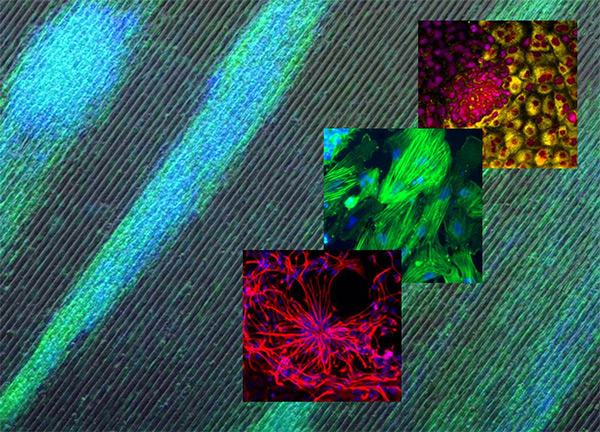Reprogrammed
 (Photos courtesy the researchers)Eight years ago, scientists first developed a process to reprogram adult cells into embryonic-like stem cells that can develop into any type of body tissue. These induced pluripotent stem cells have since become a research mainstay in regenerative medicine, disease modeling and drug screening. The current technique uses a virus to introduce gene-altering proteins into mature cells, but scientists have been hoping to improve the quality and consistency of the process. Now, a team of Berkeley scientists, including bioengineering professor Song Li, Timothy Downing (Ph.D.’13 BioE) and graduate student Jennifer Soto, has shown that physical cues can replace certain chemicals when nudging mature cells back to a pluripotent stage. The researchers grew fibroblasts—cells taken from human skin and mouse ears—on surfaces with parallel grooves. After two weeks, the researchers found a four-fold increase in the number of cells that reverted to an embryonic-like state, compared with cells grown on a flat surface. Growing cells in scaffolds of nanofibers aligned in parallel had similar effects.
(Photos courtesy the researchers)Eight years ago, scientists first developed a process to reprogram adult cells into embryonic-like stem cells that can develop into any type of body tissue. These induced pluripotent stem cells have since become a research mainstay in regenerative medicine, disease modeling and drug screening. The current technique uses a virus to introduce gene-altering proteins into mature cells, but scientists have been hoping to improve the quality and consistency of the process. Now, a team of Berkeley scientists, including bioengineering professor Song Li, Timothy Downing (Ph.D.’13 BioE) and graduate student Jennifer Soto, has shown that physical cues can replace certain chemicals when nudging mature cells back to a pluripotent stage. The researchers grew fibroblasts—cells taken from human skin and mouse ears—on surfaces with parallel grooves. After two weeks, the researchers found a four-fold increase in the number of cells that reverted to an embryonic-like state, compared with cells grown on a flat surface. Growing cells in scaffolds of nanofibers aligned in parallel had similar effects.
